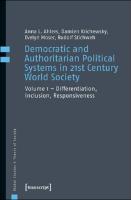Democratic and Authoritarian Political Systems in 21st Century World Society
Vol. 1 - Differentiation, Inclusion, Responsiveness
Author(s)
Ahlers, Anna L.
Krichewsky, Damien
Moser, Evelyn
Stichweh, Rudolf
Language
EnglishAbstract
This book is about the radical novelty of modern polities in a functionally differentiated world society. Premodern states were at the apex of a stratified, hierarchical society. They dominated society and all its groups and strata. Modern polities have to be understood through the ecology of relations among different function systems. They have to find and incessantly redefine their place in society. They produce decisions that are collectively binding, but in preparing these decisions experience constraints and knowledge deficiencies that are related to the complexity of a functionally differentiated society. The book concentrates on six analytical perspectives that reflect how modern polities are embedded into 21st century society. These perspectives are: the concept of inclusion and the inclusion revolution constitutive of modern polities; the internal differentiation of polities that endows them with an unprecedented complexity; the fact that polities do not know anything about society and the ways in which they compensate for this; representation and responsiveness as strategies to reconnect with society; the self-restriction of some polities that brings about ever new autonomous expert organizations; the symmetrical rise of autocracies and democracies as the two modern variants of political regimes.
Keywords
Political Inclusion; Internal Differentiation; Knowledge; Responsiveness; Functional Autonomy; Democracy; Autocracy; Globalization; Society; Politics; Sociological Theory; Sociology; Political SociologyDOI
10.14361/9783839451267ISBN
9783839451267, 9783837651263, 9783839451267Publisher
transcript VerlagPublisher website
https://www.transcript-verlag.de/Publication date and place
Bielefeld, 2020Series
Global Studies & Theory of Society, 5Classification
Sociology
Globalization
Political structures: democracy


 Download
Download